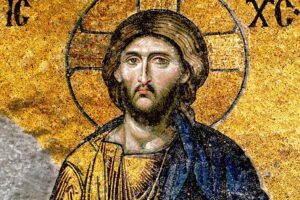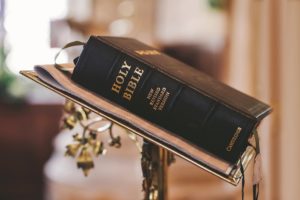Last edited on 16/Oct/2023
The Bible’s Answer
Sola Scriptura is Latin for “Scripture Alone”. It is a teaching that is accepted by Lutheran Christians and other Protestants, and acted as one of the three slogans of the Reformation (the other two being Sola Gratia and Sola Fide). Sola Scriptura means two things. First, it means that the Bible alone is the highest authority of Christian teaching—the golden standard by which all doctrines must be judged, because it is the Word of God. Second, it means that the Bible alone is sufficient for someone to read and to come to know and put their faith in Jesus Christ, and thereby receive salvation. The Solid Declaration of the Formula of Concord says:
God’s Word alone should be and remain the only standard and rule of doctrine, to which the writings of no man should be regarded as equal. Everything should be subjected to God’s Word. (Formula, Solid Declaration, Summary, Rule, and Norm 9)1
Is Sola Scriptura Biblical?
Scripture As Judge
The Bible does not directly teach Sola Scriptura in any one passage. However, Sola Scriptura naturally flows from the many passages that talk about Scripture (similar to the Blessed Trinity). In the book of Acts, St Luke records that the Berean Jews examined St Paul and Silas’ teachings against the Sacred Scriptures to see if what they were saying was true, even though they had apostolic authority:
The brothers immediately sent Paul and Silas away by night to Berea, and when they arrived they went into the Jewish synagogue. Now these Jews were more noble than those in Thessalonica; they received the word with all eagerness, examining the Scriptures daily to see if these things were so. (Acts 17:10–12, ESVUK)
Luke saw no problem with them doing so, and even called them more noble than the Jews who did not do this. This means that no matter how influential a Christian leader may be today, we must always examine their teachings against the Scriptures to see if what they are teaching is from God or not. As St John says, “do not believe every spirit, but test the spirits to see whether they are from God, for many false prophets have gone out into the world” (1Jn 4:1).
Scripture Is Sufficient for Salvation
Another passage which implies the truth of Sola Scriptura is in St Paul’s second letter to Timothy, chapter 3, where he says:
But as for you, continue in what you have learned and have firmly believed, knowing from whom you learned it and how from childhood you have been acquainted with the sacred writings, which are able to make you wise for salvation through faith in Christ Jesus. All Scripture is breathed out by God and profitable for teaching, for reproof, for correction, and for training in righteousness, that the man of God may be competent, equipped for every good work. (2 Timothy 3:14–17)
Here, Paul clearly says that the “sacred writings” (the Scriptures) are able to bring one to faith in Christ, that they are breathed out by God, which teaches their inerrancy, and that they can equip us “for every good work”. This essentially sums up the entire Christian life, which shows that Scripture itself truly is sufficient for a person’s salvation. Jesus himself declared that one can receive eternal life from the Scriptures by coming to him, of whom the Scriptures bear witness (Jn 5:39–40, 46).
Scripture As the Inerrant Guide
Furthermore, the New Testament shows instances of when even faithful apostles made mistakes in their ministries (Gal 2:11–13; Ac 15:39–40). However, we have confirmation that the Scriptures never err (Jn 10:35), and that they were breathed out by the God who never lies (2Tim 3:16; Ti 1:2). For this reason, Scripture is repeatedly testified throughout its passages as being a reliable guide, or lamp, for God’s people:
How can a young man keep his way pure? By guarding it according to your word. With my whole heart I seek you; let me not wander from your commandments! I have stored up your word in my heart, that I might not sin against you. … Your word is a lamp to my feet and a light to my path. … The sum of your word is truth, and every one of your righteous rules endures for ever. (Psalm 119:9–11, 105, 160)
And these words that I command you today shall be on your heart. You shall teach them diligently to your children, and shall talk of them when you sit in your house, and when you walk by the way, and when you lie down, and when you rise. You shall bind them as a sign on your hand, and they shall be as frontlets between your eyes. You shall write them on the doorposts of your house and on your gates. (Deuteronomy 6:6–9)
Sola Scriptura naturally flows from these passages, since when people make new doctrinal claims, we are forced to look back to God’s Word as our guide to see if what they are saying is true or not. Since the church is tasked with guarding the good deposit (God’s Word) (2Tim 1:14), it can indeed be called “a pillar and buttress of the truth” (1Tim 3:15).
What Sola Scriptura Does Not Mean
Unfortunately, there are many Christians who claim to believe in Sola Scriptura, but who either misapply or abuse it. Firstly, Sola Scriptura does not mean that one’s private interpretation of Scripture is valid, and that we can dispense with Church Tradition. Rather, it means that Church Tradition informs us on what the correct interpretation of the Word of God is, insofar as it agrees with it.
For example, people who affirm women’s ordination, or who deny the indissolubility of marriage, misapply Sola Scriptura, since they exalt their private interpretation of the Scriptures over and above the way the ancient church universally interpreted the Bible passages that contain these topics (1Tim 2:11–12; Mk 10:11–12). Church Tradition complements Scripture, not the other way around.
Secondly, Sola Scriptura does not mean that everything in the Bible is clear (2Pt 3:16). Rather, it means that the Bible is clear enough for a person to believe in Jesus and thereby come to salvation (2Tim 3:14–15). In the book of Hebrews and Ephesians, St Paul declares the Word of God to be “living and active” (Heb 4:12) and the “sword of the Spirit” (Eph 6:17), because it is the means by which the Holy Spirit creates faith in our hearts (1Cor 12:3; 1Thes 1:5; Rom 10:17). Christians still need to interpret passages properly by looking at the textual and historical contexts, the original languages, and Church Tradition, all of which is part of “rightly handling the word of truth” (2Tim 2:15).
The Benefits of Sola Scriptura
Sola Scriptura ultimately protects the church from powerful or influential figures who would lead it astray by promoting or implementing false doctrines, or by exalting manmade traditions to the level of God’s Word, and making one’s salvation dependent upon obeying them (Mk 7:6–13; Col 2:16). Throughout history, false prophets have arisen from within Christ’s church, just as Jesus said would happen (Mat 7:15–16; 24:10–11), and have committed terrible atrocities in God’s name.
However, Sola Scriptura can be used to clearly show who true Christians are, and who false prophets are, for the false prophets act against God’s Word (Mat 7:21; 1Tim 6:3–4; 1Jn 4:2–3). Using Sola Scriptura faithfully, Christians can also rebuke and silence any false teacher who would arise and attempt to lead God’s people astray, by showing clearly how their teachings contradict God’s infallible Word (Gal 1:8–9), just as the Lord Jesus powerfully refuted the Devil by using the Scripture’s authority (Mat 4:3–4).
The Early Church Fathers and Sola Scriptura
The Early Church Fathers did not lay out a clearly defined doctrine of Sola Scriptura, as happened in the Protestant Reformation; however, this does not mean it is not true. It simply means that before the Reformation, Sola Scriptura was not an issue, and therefore did not need any major discussions or debates until then. In addition, below are some quotes from key Early Church Fathers, which seem to agree with the key tenets of Sola Scriptura.
Tertullian of Carthage (c. A.D. 160–235) [in defending the truth of the Trinity against the heretic Praxeas]2
It will be your duty, however, to adduce your proofs out of the Scriptures as plainly as we do, when we prove that He made His Word a Son to Himself. . . . All the Scriptures attest the clear existence of, and distinction in (the Persons of) the Trinity, and indeed furnish us with our Rule of faith. (Against Praxeas, 11)
Irenaeus of Lyons (d. A.D. 202)
We have learned from none others the plan of our salvation, than from those through whom the Gospel has come down to us, which they did at one time proclaim in public, and, at a later period, by the will of God, handed down to us in the Scriptures, to be the ground and pillar of our faith. (Against Heresies, 3.1.1)
Athanasius of Alexandria (A.D. 296–373) [After outlining the books of the Bible, Athanasius wrote]
These are fountains of salvation, that they who thirst may be satisfied with the living words they contain. In these alone is proclaimed the doctrine of godliness. Let no man add to these, neither let him take ought from these. For concerning these the Lord put to shame the Sadducees, and said, ‘Ye do err, not knowing the Scriptures.’ And He reproved the Jews, saying, ‘Search the Scriptures, for these are they that testify of Me.’ (Festal Letter 39, 6–7)
Augustine of Hippo (A.D. 354–430)
For the reasonings of any men whatsoever, even though they be [true Christians], and of high reputation, are not to be treated by us in the same way as the canonical Scriptures are treated. We are at liberty, without doing any violence to the respect which these men deserve, to condemn and reject anything in their writings, if perchance we shall find that they have entertained opinions differing from that which others or we ourselves have, by the divine help, discovered to be the truth. I deal thus with the writings of others, and I wish my intelligent readers to deal thus with mine. (Augustine, Letters, 148.15)
See Also
- What Is the Bible?
- Is the Bible Inerrant?
- Are There More Scriptures Than the Bible?
- Who Is the Holy Spirit?
Notes
- McCain et al., ‘Concordia: The Lutheran Confessions,’ 509.
- All of the early Church Father quotes here were taken from the Master’s Seminary article “Sola Scriptura and the Church Fathers”, found at <https://blog.tms.edu/sola-scriptura-and-the-church-fathers>.
Bibliography
Busenitz, Nathan, 9 June 2015. Sola Scriptura and the Church Fathers. The Master’s Seminary. Accessed on 7 November 2021. https://blog.tms.edu/sola-scriptura-and-the-church-fathers.
McCain, Paul Timothy, Edward A. Engelbrecht, Robert C. Baker, and Gene Edward Veith, eds. Concordia: The Lutheran Confessions. Saint Louis: Concordia Publishing House, 2006.







